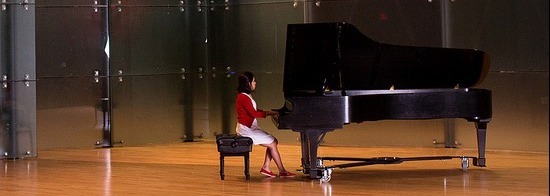Master of Arts in Music: Keyboard, Instrumental, and Vocal Concentrations
The Master of Arts in Music: Keyboard, Instrumental, and Vocal Concentrations prepare you for a career in the performing arts by focused study in advanced music performance, ensembles, recitals, and studio performance opportunities. In addition to specific courses for the different concentrations that include applied study and ensemble work, a core curriculum of research, music theory, and music history courses serve to develop an understanding of music and its cultural implications beyond the student’s chosen major. The concentrations prepare students to enter the professional performance world as performers and teachers, or for continued study at the doctoral level.
The degree culminates in a Graduate Performance Project, accompanied by a 1,000-1,500-word document regarding the project, and an oral examination on this project and coursework.
Faculty members in the Department of Music are active performers, conductors, scholars, composers, and mentors. Our faculty are dedicated to our students' success and work closely with students to help them ensure success in their chosen area of the profession. The Department of Music at Eastern Illinois University is an accredited member of the National Association of Schools of Music.
Click here for additional information on audition requirements.
Program Requirements
Vocal Performance
- MUS 5100 - Introduction to Research in Music, 3 credits
- MUS 5170 - Analytical Techniques, 3 credits
- MUS 5880 - Seminar in Music History, 3 credits
- MUS 4760 - Seminar and Practicum in Music Instruction, 2 credits
- MUS 5940 - Graduate Performance Project, 0 credits
- Applied Study - 14 credits (3 credits per semester during the first year and 4 credits per semester during the second year)
- MUS 5120 - Music Theatre/Opera Workshop, 1-4 credits
- Music Ensembles, 1-4 credits
- MUS 5990A - Independent Study (Vocal Pedagogy recommended), 1 credit
- Electives, 2 credits
- MUS 5940 - Graduate Performance Project, 0 credit
Total Credits - 32 credits
Notes:
- Vocal Performance Concentration students should be proficient in English, German, French, and Italian diction. If proficiency is not met, remedial coursework may be required.
Instrumental Performance Concentration Curriculum
- MUS 5100 - Introduction to Research in Music, 3 credits
- MUS 5170 - Analytical Techniques, 3 credits
- MUS 5880 - Seminar in Music History, 3 credits
- MUS 4760 - Seminar and Practicum in Music Instruction, 2 credits
- MUS 5940 - Graduate Performance Project, 0 credits
- Applied Study - 14 credits (3 credits per semester during the first year and 4 credits per semester during the second year)
- Ensembles, 4 credits
- Chamber Music, 1 credit
- Electives, 2 credits
- MUS 5940 - Graduate Performance Project, 0 credit
Total Credits - 32 credits
Keyboard Performance Concentration Curriculum
- MUS 5100 - Introduction to Research in Music, 3 credits
- MUS 5170 - Analytical Techniques, 3 credits
- MUS 5880 - Seminar in Music History, 3 credits
- MUS 4760 - Seminar and Practicum in Music Instruction, 2 credits
- MUS 5940 - Graduate Performance Project, 0 credits
- Applied Study - 14 credits (3 credits per semester during the first year and 4 credits per semester during the second year)
- MUS 5990A - Independent Study (Keyboard Literature recommended), 2 credits
- Chamber Music, Music Ensemble, and/or Accompanying, 3 credits
- Electives, 2 credits
- MUS 5940 - Graduate Performance Project, 0 credit
Total Credits - 32 credits
Graduate Exams and Performance Project:
- Students in the performance, composition, and conducting concentrations must pass oral comprehensive examinations and complete a graduate performance project.
- Oral exams will be given during the final semester by members of the Department of Music Graduate Faculty.
- In MUS 5940 (Graduate Performance Project Performance) the students demonstrate competency as a performer, composer, or conductor. This performance project may include a lecture component and will includes program notes.


